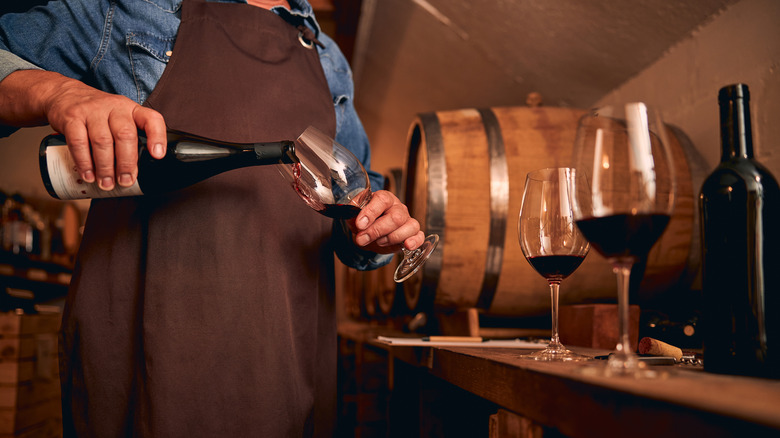This Is The Difference Between A Master Of Wine And A Master Sommelier
Oh wine. The nectar of the gods, the favorite draught of Bacchus. There are few beverages so tantalizing as that from the fruit of the vine. Yet, while we can all sniff the aroma and swish the liquid in our glasses, proclaiming authoritatively about tasting notes and color, there are incredible wine experts who actually do that for a living. Professionally speaking, there are three levels of wine experts — wine stewards, Masters of Wine, and Master Sommeliers — and the differences between them are not always clear.
Both the Masters of Wine and Master Sommelier designations are certification programs that originated in the U.K., in 1953 and 1969, respectively (per VinePair). While the programs have similarities and overlaps, the two designations differ in their intentions. The Masters of Wine program is intended for people primarily in the wine trade industry, and is more theoretical, whereas the Master Sommelier program is intended more for beverage service in a restaurant setting, including specific training on the areas of "tasting, theory, [and] service," which also includes education in beer and spirits.
A wine steward, on the other hand, is a generic term for someone who is knowledgeable about a specific restaurant's beverage program (and is often involved in building it). They help diners select the appropriate bottle for their meal (via Wine Spectator). Both Masters of Wine and Master Sommeliers are inherently stewards, but not all stewards are necessarily Master Sommeliers or Masters of Wine. Some use the lower case, generic term sommelier, but that's not the same (as noted by BinWise).
The tests are extremely challenging and rigorous
Each program has a number of courses that students must take and stringent exams they need to pass in order to be certified. One of the most challenging of these, which both programs require, is a blind tasting in which students must identify — solely by taste — features like grape variety, viticultural region, country of origin, and the wine's vintage. Masters of Wine also expects students to be able to determine commercial appeal and wine quality, per Decanter.
In addition, the Masters of Wine program requires that graduates sign a code of conduct to use the designation, assuring they'll "act with honesty and integrity and to use every opportunity to share their understanding of wine with others" (via Masters of Wine).
There are just 496 Masters of Wine and 269 Master Sommeliers worldwide in total, and while people can have both designations, only two people in the world currently hold both titles, according to Decanter.
Gerard Basset MW MS OBE, a 2010 winner of Best Sommelier in the World, also held both titles until his death in 2019. In a 2017 interview with Decanter, he clarified the difference between the two programs. "Both test candidates on wine knowledge and tasting skills but in a very different way." He continued, "Inevitably, those in the catering industry will benefit most from the [Master Sommelier] ... For those in the wine trade and with a more academic mind, the [Masters of Wine] is a more logical choice."

